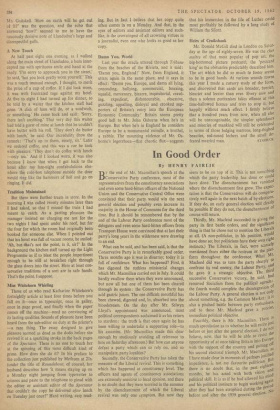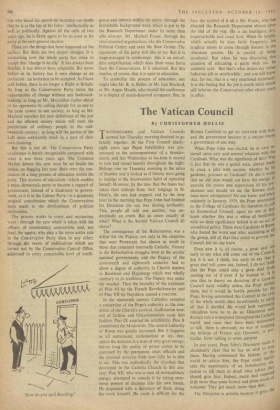In Good Order
By HENRY FAIRLIE Y the end of Mr. Macmillan's speech at the rpl Conservative Party conference, most of the representatives from the constituency associations and even some hard-bitten officers of the National Union and the Conservative Central Office were convinced that their party would win the next general election and possibly even increase its majority in the House of Commons for the third time. But it should be remembered that by the end of the Labour Party conference most of the delegates and even some hard-bitten officers from Transport House were convinced that at last their party's long years in the wilderness were drawing to an end.
What can be said, and has been said, is that the Conservative Party is in remarkably good order. Three months ago it was in disarray; today it is full of confidence. What has happened? First, it has digested the ruthless ministerial changes which Mr. Macmillan carried out in July. It could hardly swallow them when they were announced, but now all but one of them has been cleared through its system : the Conservative Party has acid gastric juices. The one difficult mouthful has been chewed, digested and, lo, absorbed into the bloodstream. On the day after Mr. Selwyn Lloyd's appointment was announced, most political correspondents acclaimed it as his return to stardom : the truth is that once again he has been willing to undertake a supporting role—to his assassins. (Mr. Macmillan made this clear enough by studiously avoiding all reference to him on Saturday afternoon.) But how can anyone defeat a party which can so rely on, and so manipulate, party loyalties?
Secondly, the Conservative Party has taken the measure of the Liberal revival. This is something which has happened at constituency level. The officers and agents of constituency associations are extremely sensitive to local opinion, and there is no doubt that they were worried in the summer by the disenchantment of which the Liberal revival was only one symptom. But now they seem to be on top of it. This is not something which the party leadership has done or could have done. The disenchantment has vanished where the disenchantment first grew. The expec- tation is that the Conservatives will do compara- tively well again in the next batch of by-elections. If they do, an early general election will clearly be possible If they do not, the disenchantment of course will return.
Thirdly, Mr. Macleod succeeded in giving the party its first battle orders, and the significant thing is that he chose not to mention the Liberals at all. (A non-politician, in his position, would have done so; but politicians have their own right instincts.) The Liberals, in fact, were scarcelY mentioned from either the rostrum or the Plat" form throughout the conference. What Mr. Macleod did was to turn the party sharply to confront its real enemy, the Labour Party, and he gave it a strategic objective. The third successive Conservative victory, he said, had removed Socialism from the political agenda:. the fourth would complete the disintegration of the Labour Party. A general election is not only about something, e.g. the Common Market : it is also a pitched battle between party enthusiasts, and to these Mr. Macleod gave a Precise' immediate political objective. Fourthly, there is Mr. Macmillan. There is .
much speculation as to whether he will retire Just before or just after the general election. I do net believe, now, that he will be able to resist the opportunity of at once taking Britain into Europe with the support of the country and pulling fi his second electoral triumph. Mr. Macmillan. as erl o after they had been atrophied during the pd No I have made clear in moments of perhaps justified
But
impatience, is not my favourite politician. t there is no doubt that, in the past eighteen e months, he has acted with both vision att‘' political skill. It is as if he had allowed his in ag tn° and his political instincts to begin working il! before and after the 1959 general election.
one who heard his speech on Saturday can doubt that he is at the top of his form : intellectually as well as politically. Against all the odds of two years ago, he is likely again to be an asset to his party at the next general election.
These are the things that have happened on the surface. But there are two deeper changes. It is astonishing how the whole party has come to accept that 'change is its ally'. It has always been flexible; it has always been adaptable. But never before in its history has it seen change as an invitation: an invitation to be accepted. As I have said before, there is no longer a Right in Britain. As long as the Conservative Party seizes the opportunities of change without any backward- looking; as long as Mr. Macmillan rushes ahead of his opponents by calling sharply for an end to the caste system in our society; as long as Mr. Macleod searches for new definitions of the just and the efficient society which will meet the puzzlement of ordinary people in the mid- twentieth century: so long will the parties of the Left seem awkwardly stuck in a past of their own choosing.
But this is not all. The Conservative Party conference is barely recognisable compared with what it was three years ago. The Common Market debate this year must be set beside the debate on flogging last year. Both were the con- clusion of a long process of education within the party. This process of education—which enables a mass, democratic party to become a support of government, instead of a hindrance to govern- ment, as it is in the Labour Party—is a genuinely original contribution which the Conservatives have made to the development of political institutions.
The process works in many and mysterious \says : through the care which is taken with the officers of constituency associations and, not least, the agents, who play a far more active role in the Conservative Party than in any other; through the reams of publications which are turned out by the Conservative Central Office, addressed to every conceivable level of intelli- 'llow do you spell Becching?' gence and interest within the party; through the formidable background work which is put in by the Research Department under its more than able director, Mr. Michael Fraser; through the semi-attached organisations like the Conservative Political Centre and even the Bow Group. The opponents of the party still like to say that it is stage-managed in conference: this is an out-of- date simplification which does them more harm than the Conservatives. It is educated. But this implies, of course, that it is open to education.
To symbolise this process of education, one might take Mr. R. A. Butler, or Mr. lain Macleod, or Mr. Angus Maude, who treated the conference to a display of much-deserved arrogance. But, in
fact, the symbol of it all is Mr. Fraser, who has directed the Research Department almost since the end of the war. He is an intelligent, dry, imperturbable east coast Scot. When he laughs, which actually he does fairly frequently. his laughter seems to come through fissures in the Aberdeen granite. He is careful of being emotional. But when he was discussing this question of educating a party with me, he suddenly said: 'But that's what makes my rather ludicrous job so worth-while: and you will know that, for me, that is a very emotional statement'. It is this feeling that the job is worth while which still informs the Conservatives after eleven years in office.















































 Previous page
Previous page